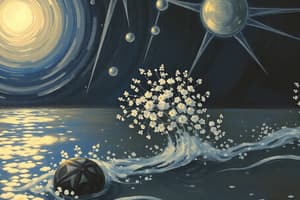Podcast
Questions and Answers
What is the main purpose of the scientific method?
What is the main purpose of the scientific method?
- To formulate testable hypotheses and validate them through experimentation. (correct)
- To create theories without testing them.
- To observe phenomena without drawing conclusions.
- To collect data without any analysis.
Which branch of science focuses on weather and climate?
Which branch of science focuses on weather and climate?
- Biology
- Zoology
- Geology
- Meteorology (correct)
Which statement best defines a scientific theory?
Which statement best defines a scientific theory?
- A proven fact that cannot be challenged.
- An assumption made without observation.
- A collection of untested hypotheses.
- A well-substantiated explanation based on evidence. (correct)
What is one key aspect of scientific ethics?
What is one key aspect of scientific ethics?
What promotes collaboration and innovation in science?
What promotes collaboration and innovation in science?
Which of the following is an example of a life science?
Which of the following is an example of a life science?
Why is scientific literacy important?
Why is scientific literacy important?
Which of the following trends is currently significant in science?
Which of the following trends is currently significant in science?
Flashcards are hidden until you start studying
Study Notes
Key Concepts in Science
-
Definition of Science
- Systematic study of the structure and behavior of the physical and natural world.
- Based on empirical evidence and experimentation.
-
Scientific Method
- Observation: Gathering data and identifying a phenomenon.
- Hypothesis: Formulating a testable statement.
- Experiment: Conducting tests to validate or refute the hypothesis.
- Analysis: Interpreting data and results.
- Conclusion: Drawing inferences from the data.
- Repeat: Repeating experiments to verify results.
-
Branches of Science
- Physical Sciences
- Physics: Study of matter, energy, and their interactions.
- Chemistry: Study of substances, their properties, and reactions.
- Life Sciences
- Biology: Study of living organisms and their ecosystems.
- Botany: Study of plants.
- Zoology: Study of animals.
- Earth Sciences
- Geology: Study of the Earth’s structure and processes.
- Meteorology: Study of weather and climate.
- Oceanography: Study of oceans and marine life.
- Physical Sciences
-
Key Scientific Principles
- Theory: Well-substantiated explanation of an aspect of the natural world.
- Law: Statement based on repeated experimental observations that describe some aspects of the universe.
- Evidence: Information that supports or contradicts a hypothesis or theory.
-
Importance of Science
- Advances technology and healthcare.
- Informs public policy and environmental stewardship.
- Enhances understanding of the universe and human existence.
-
Ethics in Science
- Integrity: Honesty in conducting and reporting research.
- Responsibility: Accountability for research impacts.
- Ethical treatment of human and animal subjects.
-
Interdisciplinary Nature
- Combines elements from various fields (e.g., biochemistry merges biology and chemistry).
- Promotes collaboration and innovation.
-
Current Trends in Science
- Artificial Intelligence and Machine Learning.
- Genetic Engineering and CRISPR technology.
- Climate Change research and sustainable practices.
-
Scientific Literacy
- Understanding scientific concepts and processes.
- Ability to critically evaluate scientific information and claims.
Definition of Science
- Systematic study focusing on the structure and behavior of the physical and natural world.
- Relies on empirical evidence obtained through experimentation and observation.
Scientific Method
- Observation: Involves data collection and identifying phenomena.
- Hypothesis: Creation of a testable and falsifiable statement.
- Experiment: Execution of tests to confirm or disprove the hypothesis.
- Analysis: Interpretation of collected data and experimental results.
- Conclusion: Derivation of insights and inferences from the analysis.
- Repeat: Reiteration of experiments to ensure reliability and validation of findings.
Branches of Science
- Physical Sciences:
- Physics: Examines matter and energy interactions.
- Chemistry: Investigates substances, their properties, and reactions.
- Life Sciences:
- Biology: Explores living organisms and ecosystems.
- Botany: Focuses on plant life and characteristics.
- Zoology: Studies animal behavior and biology.
- Earth Sciences:
- Geology: Analyzes Earth's structure, processes, and materials.
- Meteorology: Studies atmospheric conditions, weather, and climate.
- Oceanography: Examines oceans and marine ecosystems.
Key Scientific Principles
- Theory: Robust explanation that is substantiated by extensive evidence.
- Law: Descriptive statement derived from repeated experimental observations.
- Evidence: Information supporting or challenging a hypothesis or theory.
Importance of Science
- Catalyzes advancements in technology and healthcare sectors.
- Influences public policy decisions and environmental management.
- Deepens understanding of the universe and human life.
Ethics in Science
- Integrity: Commitment to honesty in conducting and reporting research activities.
- Responsibility: Recognition of accountability for the implications of research findings.
- Ethical Treatment: Ensures humane and respectful treatment of both human and animal subjects in research.
Interdisciplinary Nature
- Blends elements from distinct fields; for instance, biochemistry integrates biology and chemistry.
- Encourages collaborative efforts that foster innovative solutions.
Current Trends in Science
- Development and application of Artificial Intelligence and Machine Learning technologies.
- Advancements in genetic engineering, including CRISPR technology.
- Focused research on climate change and implementation of sustainable practices.
Scientific Literacy
- Knowledge of scientific concepts and methods.
- Skill to critically assess scientific information and claims for validity.
Studying That Suits You
Use AI to generate personalized quizzes and flashcards to suit your learning preferences.





